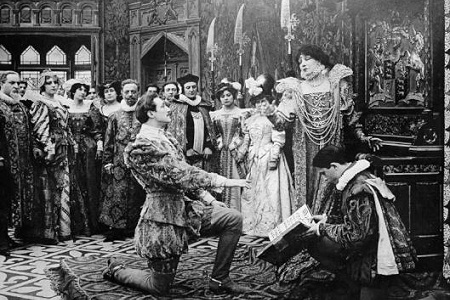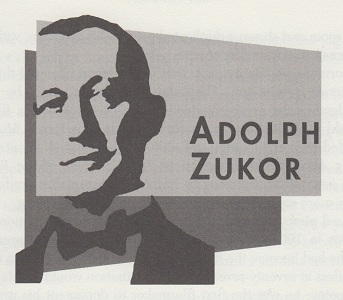Born: January 7, 1873, Risce, Hungary
Died: June 10, 1976, Los Angeles, CA
Zukor bought up as many film adaptation rights as he could and enticed big names away from the theater.
—André Bazin
Fifteen-year-old immigrant Adolph Zukor didn’t take long to discover opportunity in America; he started a nickelodeon in 1903 and eight decades later, he was still a vital part of show business. He teamed up with Marcus Loew in 1904, and they began purchasing theaters in New Jersey, Philadelphia and Boston, systematically gobbling up their competitors before forming the largest chain of semipalatial theaters on the East Coast, Loew’s Consolidated. As treasurer of the company, Zukor guided the expansion of the company into a national chain of theaters that founded a film empire.
However, Zukor was more interested in the distribution of films than their exhibition. In 1912, he left Loew to finance film productions of famous Broadway plays. Zukor’s idea was to recruit stage actors to repeat their performances, a concept he would master over the years. His first success came after he bought the distribution rights to Queen Elizabeth (1912), a British four-reeler starring the respected Sarah Bernhardt. The film was a hit in America, and the profits afforded the creation of Zukor’s Famous Players Company with a new partner, Edwin S. Porter, who directed many of their first productions. Together, they signed superstar Mary Pickford and forced theater owners to pay premium prices for her films.
Now immersed in the film production business, Zukor became a shrewd talent scout and promoter. He turned Pickford’s “America’s Sweetheart” image into an international campaign. Later, his handling of the “It Girl,” Clara Bow, would extend her career to more than fifty features during the Roaring Twenties. He merged again in 1916, this time with Jesse Lasky and his Feature Play Company. Lasky produced the first feature film made in Hollywood, The Squaw Man (1914), and had a stable of talent including idol Gloria Swanson and director Cecil B. DeMille.
After a series of financial reorganizations, Zukor and Lasky merged with a few smaller companies in 1935 under the name Paramount. Zukor arranged for a $10 million loan to buy up more theaters, more book rights and more actors. Nobody in Hollywood had a keener sense of talent or a more astute notion of distribution. He offered Roscoe “Fatty” Arbuckle a million-dollar contract to join Paramount and direct comedies. He also secured long-term contracts from actors like Claudette Colbert, Wallace Beery, Bob Hope, Gary Cooper, Bing Crosby, Dorothy Lamour, Marion Davies, Alan Ladd, Veronica Lake, Fred MacMurray, Ray Milland and the Marx Brothers. Almost every other studio had to deal with him in one capacity or another; they borrowed his stars, they purchased from his huge collection of story rights and they attached their films to his “blocks” of theater bookings, i.e. renting their films to theaters in packages of features, shorts and cartoons.
Zukor was also responsible for the exodus of foreign filmmakers to Paramount in the 1930s. The studio became known for its exotic stars such as Marlene Dietrich, Maurice Chevalier, Pola Negri and Emil Jannings. Setting up production facilities in Europe, Paramount created a testing ground for emerging directors, including Alfred Hitchcock and Hans Dreier. Others were simply imported to the U.S. by Zukor, who dragged Ernst Lubitsch, Rouben Mamoulian and Billy Wilder to Hollywood.
A special Oscar in 1948 honored his vast contribution to the industry. From film exhibition to film distribution to film production, Zukor steered his companies through the glory days of the silent era and made his impression felt in the coffers of Paramount. He restructured the company in 1932 after attempts by Lasky to unseat him were foiled. He remained president during the Depression, becoming a figurehead chairman of the board in 1936, and continued to show up for work daily until 1973, the hundredth anniversary of his birth. Zukor died at age 103. As the head of Hollywood’s most consistently powerful studio, Adolph Zukor was a key figure in the film community for more than eighty years.
To read all the republished articles from ‘The Film 100,’ go to Reintroducing the Film 100 here on Keyframe.





